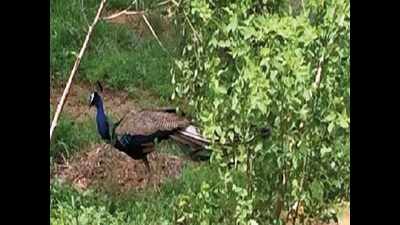- News
- City News
- gurgaon News
- 67 peacocks, treated for Newcastle disease, released
Trending
This story is from July 9, 2018
67 peacocks, treated for Newcastle disease, released
Sixty-seven peacocks were released into their habitat on Sunday, after they were successfully treated for the Virulent Newcastle Disease (VND).

90 peacocks were admitted after the outbreak of the disease on June 1
GURUGRAM: Sixty-seven peacocks were released into their habitat on Sunday, after they were successfully treated for the Virulent Newcastle Disease (VND).
They were among over 90 peacocks that were admitted to the temporary medical facility set up in Bhondsi, after the outbreak of the disease on June 1. Twenty two of the admitted birds died.
“We released the peacocks that were successfully treated, after getting necessary permission to do so.There still are a few birds left at the facility. Their condition is stable and they will soon be released too. Also, there has been no report of peacock deaths now so it is safe to release the birds,” said Shyam Sunder, district wildlife officer, Gurugram.
In the past month, about 30 peacocks died after getting infected with the virus. The district authorities ordered vaccination for all poultry in the city. More than 50,000 poultry birds were vaccinated. Cases were reported from three villages — Bhondsi, Akhlimpur and Tikli. “Most peacocks had symptoms including twisted head and neck, swelling around eyes, stiffness in the body and clouded vision. The infected birds were kept under observation after the outbreak of the virus was confirmed by the authorities,” said Anil Gandas, a wildlife enthusiast, who rescued many peacocks across the city.
They were among over 90 peacocks that were admitted to the temporary medical facility set up in Bhondsi, after the outbreak of the disease on June 1. Twenty two of the admitted birds died.
“We released the peacocks that were successfully treated, after getting necessary permission to do so.There still are a few birds left at the facility. Their condition is stable and they will soon be released too. Also, there has been no report of peacock deaths now so it is safe to release the birds,” said Shyam Sunder, district wildlife officer, Gurugram.
In the past month, about 30 peacocks died after getting infected with the virus. The district authorities ordered vaccination for all poultry in the city. More than 50,000 poultry birds were vaccinated. Cases were reported from three villages — Bhondsi, Akhlimpur and Tikli. “Most peacocks had symptoms including twisted head and neck, swelling around eyes, stiffness in the body and clouded vision. The infected birds were kept under observation after the outbreak of the virus was confirmed by the authorities,” said Anil Gandas, a wildlife enthusiast, who rescued many peacocks across the city.
Listed as a notifiable disease under the Prevention and Control of Infectious and Contagious Diseases in the Animals Act 2009, VND is a highly contagious and fatal viral disease that can affect wild birds and poultry. The virus is found in respiratory discharges and faeces, and it can cause severe sickness and death in birds. Though the disease doesn't spread to humans, those living close to the infected birds may get mild conjunctivitis or mild fever-like symptoms.
End of Article
FOLLOW US ON SOCIAL MEDIA










